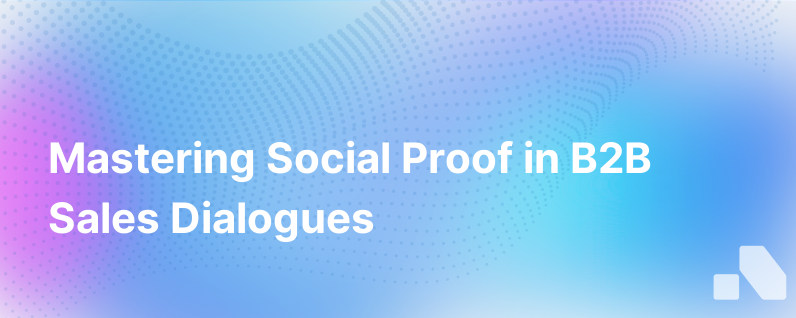Leveraging Social Proof in B2B Sales Conversations
Published on November 3, 2023 by Sawyer Middeleer
title: Leveraging Social Proof in B2B Sales Conversations date: 2023-04-15 author: Aomni Marketing Team
In the world of B2B sales, the art of persuasion is often entwined with the power of social proof. Social proof in a B2B context is the evidence that other businesses have benefited from a product or service, which can then influence decision-makers to consider a similar investment for their own companies. This bandwagon effect is not just a psychological phenomenon; it's an essential component of a winning sales strategy.
Understanding Social Proof in B2B Sales
Social proof resonates deeply with potential buyers due to its grounding in credibility and collective approval. It's present in various forms, including client logos showcased on websites, customer testimonials, ratings and reviews on third-party platforms, case studies, and social media endorsements. According to Nielsen, 92% of customers trust non-paid recommendations over any other type of advertising.
In a B2B setting, where sales cycles are longer and the stakes are higher, social proof can be the difference between a signed contract and an opportunity lost. B2B buyers are often tasked with due diligence; they need to justify their decisions with data and testimonials from their trusted peers.
Harnessing Social Proof for Powerful Sales Conversations
To leverage social proof effectively, it's crucial to understand and thoughtfully integrate it into your sales narrative. Here are some ways to do that:
-
Client Testimonials: Strategic placement of testimonials can influence potential buyers at critical decision points. Case-specific testimonials from similar industries or addressing similar challenges can be compelling.
-
Case Studies: Deep-dive case studies provide a narrative journey of how your product or service solved specific problems. They can serve as a roadmap for prospects considering a similar journey.
-
Customer Success Stories: Short, impactful stories that highlight the before-and-after of your customers can illustrate the tangible impact your solution offers. These are great conversation starters.
-
Client Logos: Displaying recognizable client logos on your website and sales materials can act as powerful visual endorsements, enhancing your brand reputation and trustworthiness.
-
User Reviews and Ratings: Positive reviews on B2B software directories drive credibility. Encourage your happy customers to leave honest reviews.
-
User-Generated Content: Encouraging users to share their experiences on social media platforms can extend your reach and provide authentic endorsements.
-
Influence of Numbers: Publishing metrics that indicate adoption (such as 'used by over xyz companies') can demonstrate widespread trust and reliability in your product or service.
Crafting Social Proof Strategically
Every piece of social proof should be selected with intentionality. It's not just about quantity, but about showcasing the quality and relevance of the endorsements your business has earned. The following points should be taken into consideration:
-
Industry Relevance: Share success stories and testimonials from clients that are respected in the industry you are targeting.
-
Problem-Solution Fit: Social proof should align with the specific pain points and challenges faced by your potential buyers to show that your solution can meet their unique needs.
-
Diversity of Testimonials: A mix of large multinational companies and smaller firms as part of your testimonials can demonstrate versatility and the universal appeal of your product.
-
Current and Ongoing Success: Ensure that the social proof remains current, as outdated testimonials or case studies may lose their potency.
Social Proof Beyond the Sale
It's important to consider that leveraging social proof doesn't end once a sale is made. In B2B sales, where upselling and cross-selling opportunities are vital, maintaining and building upon existing social proof can help secure future sales and reinforce customer loyalty.
Encourage ongoing dialogue with customers after they've made a purchase. Their evolving experience with your product or service can spur new case studies and testimonials, which in turn can help you continue to build meaningful social proof.
In Conclusion
Adopting a strategic approach to social proof in B2B sales engages your potential clients on an authentic and relatable level, often tipping the scales in your favor. Integrating diverse and relevant sources of social proof into your sales conversations can accelerate the buyer's journey by fostering trust and confidence in your solution.
Remember, while a well-rounded strategy of social proof can greatly enhance your B2B sales efforts by providing the reassurance that potential clients often need, it is the quality and relevance of the evidence that is paramount. Consequently, B2B sales teams should thoughtfully curate social proof, ensuring aligment with prospects' expectations and needs.
At Aomni, we hone in on delivering data-driven sales support for your strategic approach, enabling you to present real, impactful social proof with ease. Our platform can compile and display relevant social proofs in your conversations, ensuring you always make a compelling case to your potential buyers.
Sources:
- The Power of Social Proof in B2B Sales: Trusting the Wisdom of the Crowd
- Psychology in B2B Marketing: Social Proof
- The Role of Social Proof in Your B2B Marketing Strategy
- B2B Sales and the Power of Social Proof: From Doubt to Delight
- Leveraging Social Proof via Case Studies to Increase Your Sales Conversions
- B2B Sales Guide to Customer Testimonials
- Video Testimonials that Close Deals Faster
- The Psychology of Social Proof (and Why You Need Your Customers' Help)